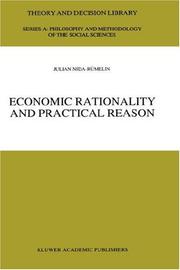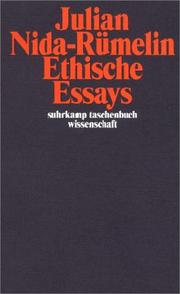| Listing 1 - 10 of 68 | << page >> |
Sort by
|
Book
ISBN: 9783518295328 3518295322 Year: 2009 Volume: 1932 Publisher: Frankfurt am Main Suhrkamp
Abstract | Keywords | Export | Availability | Bookmark
 Loading...
Loading...Choose an application
- Reference Manager
- EndNote
- RefWorks (Direct export to RefWorks)
Gründe geben unserer rational und normativ verfaßten Lebensform die Struktur, deren wir als Menschen bedürfen – als Mitglieder dieser, wie Julian Nida-Rümelin sagt, »merkwürdigen Spezies, deren hinreichend entwickelte Exemplare sich in ihren Urteilen und ihrem Handeln von Gründen leiten lassen«. Welche Rolle spielt dabei die wissenschaftliche Erkenntnis? In welchem Verhältnis stehen Lebensform und Wissenschaft, Bedeutung und Intention, Ethik und Alltagspraxis, Moral und Politik? Mit diesen Fragen beschäftigen sich die hier versammelten philosophischen Abhandlungen von Nida-Rümelin, die seine pragmatistische Philosophie exemplarisch dokumentieren.
Political philosophy. Social philosophy --- General ethics --- Ethics --- Lifestyles --- Philosophy --- Political participation
Book
ISBN: 3520423014 Year: 1991 Publisher: Stuttgart Kröner
Abstract | Keywords | Export | Availability | Bookmark
 Loading...
Loading...Choose an application
- Reference Manager
- EndNote
- RefWorks (Direct export to RefWorks)
Biography: 1900-1999 --- Philosophers --- Philosophy, Modern --- -Philosophers --- Scholars --- Modern philosophy
Book
ISBN: 3319955071 3319955063 Year: 2019 Publisher: Cham : Springer International Publishing : Imprint: Springer,
Abstract | Keywords | Export | Availability | Bookmark
 Loading...
Loading...Choose an application
- Reference Manager
- EndNote
- RefWorks (Direct export to RefWorks)
In this book, the author shows that it is necessary to enrich the conceptual frame of the theory of rational choice beyond consequentialism. He argues that consequentialism as a general theory of rational action fails and that this does not force us into the dichotomy teleology vs deontology. The unity of practical reason can be saved without consequentialism. In the process, he presents insightful criticism of standard models of action and rational choice. This will help readers discover a new perspective on the theory of rationality. The approach is radical: It transcends the reductive narrowness of instrumental rationality without denying its practical impact. Actions do exist that are outlined in accordance to utility maximizing or even self-interest maximizing. Yet, not all actions are to be understood in these terms. Actions oriented around social roles, for example, cannot count as irrational only because there is no known underlying maximizing heuristic. The concept of bounded rationality tries to embed instrumental rationality into a form of life to highlight limits of our cognitive capabilities and selective perceptions. However, the agent is still left within the realm of cost-benefit-reasoning. The idea of social preferences or meta-preferences cannot encompass the plurality of human actions. According to the author they ignore the plurality of reasons that drive agency. Hence, they coerce agency in fitting into a theory that undermines humanity. His theory of structural rationality acknowledges lifeworld patterns of interaction and meaning. .
Analysis (Philosophy) --- Analysis, Linguistic (Philosophy) --- Analysis, Logical --- Analysis, Philosophical --- Analytic philosophy --- Analytical philosophy --- Linguistic analysis (Philosophy) --- Logical analysis --- Philosophical analysis --- Philosophy, Analytical --- Language and languages --- Methodology --- Philosophy --- Logical positivism --- Semantics (Philosophy) --- Social sciences --- Analysis (Philosophy). --- Philosophy. --- Theory (Philosophy). --- Philosophy of the Social Sciences. --- Analytic Philosophy. --- Philosophical Methodology. --- Mental philosophy --- Humanities --- Social philosophy --- Social theory --- Philosophy and social sciences. --- Social sciences and philosophy
Book
ISBN: 9783319955063 9783319955070 Year: 2019 Publisher: Cham Springer
Abstract | Keywords | Export | Availability | Bookmark
 Loading...
Loading...Choose an application
- Reference Manager
- EndNote
- RefWorks (Direct export to RefWorks)
Book
ISBN: 8445728954 9788445728956 Year: 2009 Publisher: Vitoria-Gasteiz: Eusko jaurlaritzaren argitalpen-zerbitzu nagusia,
Abstract | Keywords | Export | Availability | Bookmark
 Loading...
Loading...Choose an application
- Reference Manager
- EndNote
- RefWorks (Direct export to RefWorks)

ISBN: 0792344936 Year: 1997 Publisher: Dordrecht : Kluwer academic,
Abstract | Keywords | Export | Availability | Bookmark
 Loading...
Loading...Choose an application
- Reference Manager
- EndNote
- RefWorks (Direct export to RefWorks)
Object
Publisher: Hamburg : Bucerius,
Abstract | Keywords | Export | Availability | Bookmark
 Loading...
Loading...Choose an application
- Reference Manager
- EndNote
- RefWorks (Direct export to RefWorks)

ISBN: 3518290304 Year: 1999 Publisher: Frankfurt am Main Suhrkamp
Abstract | Keywords | Export | Availability | Bookmark
 Loading...
Loading...Choose an application
- Reference Manager
- EndNote
- RefWorks (Direct export to RefWorks)
Book
ISBN: 3110136562 3110871556 Year: 1994 Publisher: Berlin de Gruyter
Abstract | Keywords | Export | Availability | Bookmark
 Loading...
Loading...Choose an application
- Reference Manager
- EndNote
- RefWorks (Direct export to RefWorks)
Decision making --- Rational choice theory --- Reasoning --- Congresses

ISBN: 3518291653 Year: 2002 Publisher: Frankfurt am Main Suhrkamp
Abstract | Keywords | Export | Availability | Bookmark
 Loading...
Loading...Choose an application
- Reference Manager
- EndNote
- RefWorks (Direct export to RefWorks)
| Listing 1 - 10 of 68 | << page >> |
Sort by
|

 Search
Search Feedback
Feedback About UniCat
About UniCat  Help
Help News
News